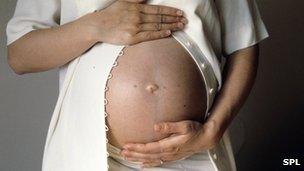Induced labour 'linked to autism'
- Published

Children whose mothers needed drugs to start giving birth are slightly more likely to have autism, US researchers say.
A study of 625,000 children, published in JAMA Pediatrics, showed the autism link was stronger in boys.
Scientists have called for more research to explain the difference as it is not clear why there would be a link.
Doctors said inducing labour was safe, necessary and could save a baby's life.
Autism is thought to be caused by a combination of family, or genetic, risk and conditions in the womb and early life while the child is developing.
Procedure could be life-saving
The study of births in North Carolina showed 13 out of every 1,000 boys born, and four per 1,000 girls, developed autism.
However, the rate was a third higher in boys when their mother needed drugs to induce or assist the pregnancy, while any effect in girls was more muted.
Researchers said that two cases of autism in every 1,000 births might be prevented by stopping induction. However, they warned this would come at significant cost as the procedure could be life-saving.
Prof Simon Gregory, of Duke University, said there had been a lot of conflicting evidence on autism and inducing labour, but this study was the largest to look at the issue.
He told the BBC: "We don't want mothers to say, 'Under no circumstances do I want to be induced because I don't want a kid with autism'. That would be plain wrong.
"We've found an association and more research is needed. This allows us to focus on the factors around birth that may affect autism and how it develops."
The study only shows that the rates of autism are higher after being induced. It could be down to the drugs used to begin labour or something else influencing the pregnancy that leads to women needing to be induced and also affects the developing brain.
'Good medical reasons'
Labour is often induced when the pregnancy has gone on too long and the mother has missed the due date, normally by at least a week.
Michael Heard, of Hampshire Hospitals NHS Foundation Trust and the Royal College of Obstetricians and Gynaecologists spokesperson, said: "We induce to improve outcomes. You reduce the chance of losing the baby and the chance of mum and baby getting unwell.
"This is a preliminary statistical overview, with no clear reasoning why the two things should be linked.
"Induction is very common and is offered for good medical reasons and is extremely safe. But like most medical processes there is a small risk associated.
"This is another thing to consider in a long-term study, but not something I'd consider in my practice."
Carol Povey, of the National Autistic Society, said: "Autism is a complex condition and is thought to be the result of many different underlying physical and genetic factors. Its exact causes are still being investigated.
"The scientists who conducted this study acknowledge that further research is required before any hard and fast conclusions can be drawn.
"It's therefore important that people do not jump to conclusions about this study and its implications."
- Published9 August 2013
- Published16 January 2013
- Published27 November 2012
- Published25 April 2012
- Published27 January 2012